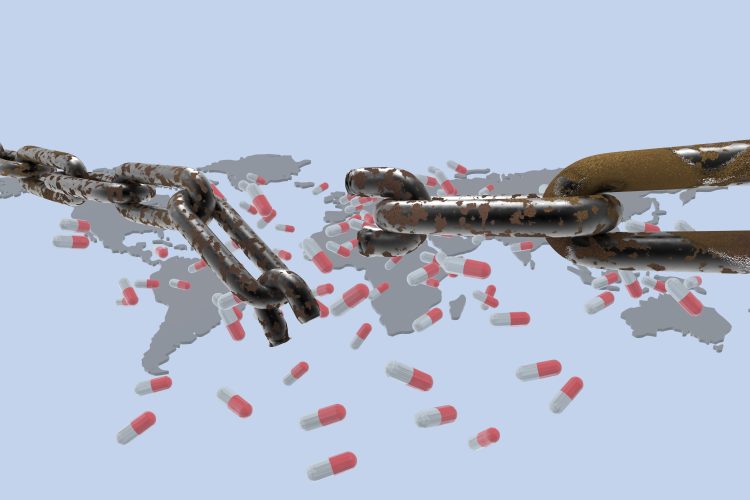Strengthening and transforming the pharmaceutical supply chain
Posted: 21 July 2023 | Caroline Peachey (European Pharmaceutical Review) | No comments yet
In this exclusive interview, Naser Al Yammahi, Deputy CEO of Hayat Biotech explores challenges facing the pharmaceutical supply chain, medicine shortages and looks at how technology advances will drive supply chain transformation.


Manufacturing delays and capacity issues that continue to impact the pharmaceutical supply chain have led to medicine shortages around the globe; an issue that has been exacerbated further by geopolitical events, the energy crisis and rising inflation.
A recent report from the US Food and Drug Administration (FDA) shows that while the number of new drug shortages has fallen significantly from a high of 250 in 2011 to 49 in 2022, there was an increase in new drug shortages year-on-year.
FDA said manufacturers in the US and abroad continue to experience quality issues and struggles with capacity constraints. These issues combined with ‘dramatic and rapid’ changes in demand for some products, have placed additional strain on the pharmaceutical supply chain, making it harder to avoid medicine shortages.
Europe, too, has faced similar issues with its pharmaceutical supply chain, including critical shortages of antibiotics such as amoxicillin. Recent guidance published by the European Medicines Agency outlines measures that will be taken to increase preparedness for the autumn/winter 2023-2024. Recommendations were also published earlier this year for all stakeholders in the pharma supply chain.
In this Q&A EPR speaks to Naser Al Yammahi the Deputy CEO of Hayat Biotech about pharmaceutical supply chain challenges and how they can be addressed. Yammahi was instrumental in building Hayat’s extensive distribution network needed to supply vaccines during the COVID-19 pandemic.
What are the top three supply-related challenges facing pharmaceutical manufacturers?
The pharmaceutical industry faces challenges due to varying regulations and requirements across different regions and countries”
Naser Al Yammahi: The pharmaceutical industry faces challenges due to varying regulations and requirements across different regions and countries. Manufacturers must navigate this complex landscape, obtain necessary certifications, and stay updated with evolving regulations.
Globalisation and supply chain complexity are a factor. The significant challenges, here, lie in effectively managing the complexity and coordination among diverse interconnected networks, particularly when operating across countries with varying regulations. Hayat Biotech’s global supply chain, spanning distribution to 64 countries, entails the involvement of multiple suppliers, distributors, and contract manufacturing organisations.
The storage and transportation of temperature-sensitive pharmaceutical products, such as vaccines and biologics, require strict temperature control throughout the supply chain to maintain their efficacy.
How can these issues be addressed?


Establish strong regulatory partnerships: Collaborate with regulatory authorities to establish clear guidelines, harmonise regulations, and streamline processes across different regions and countries.
Embrace digital transformation: Invest in advanced technology and automation to enhance efficiency, traceability, and compliance in manufacturing processes, supply chain management, and quality control.
Foster strategic collaborations: Build strong partnerships with suppliers, distributors, and contract manufacturing organisations to improve coordination, enhance visibility, and address supply chain complexities.
Prioritise cold chain logistics: Invest in state-of-the-art facilities and technologies for the storage, handling, and transportation of temperature-sensitive products, such as vaccines, to maintain their efficacy throughout the supply chain.
What types of medicinal products are in short supply and why?
The FDA’s Device Shortage List, as of 8 June 2023, includes various medical devices such as those used in anaesthesiology, cardiovascular care, dialysis, radiology, and more. The shortages stem from increased demand, part discontinuation, compliance requirements, and a scarcity of semiconductor chips.
29 European countries report worsening shortages, particularly for drugs related to respiratory, anti-infective, cardiovascular, and gastrointestinal conditions”
Regarding medicines, 29 European countries report worsening shortages, particularly for drugs related to respiratory, anti-infective, cardiovascular, and gastrointestinal conditions. The UK experiences Hormone Replacement Therapy (HRT) shortages, US hospitals face a liquid ibuprofen shortage, and there are chronic medicine shortages in Mexico, supply drops in Asia linked to China, and numerous shortages in rural areas of Australia.
These shortages were exacerbated by COVID-19 lockdowns disrupting drug circulation and increasing demand for certain medications. Some countries have blocked parallel trade to prevent supplies from depleting. Utilising data, sharing supplies, and employing analytics are essential for improving global access to medicines and enhancing supply chain efficiency through artificial intelligence (AI).
While supply chain challenges became evident during the pandemic, several regions worldwide still face issues leading to product shortages. For example, the British biotechnology industry encounters obstacles such as funding constraints, regulatory barriers, and talent shortages. Additionally, Brexit has introduced uncertainty and disruption, further impacting the sector.
What is the main lesson industry can take from supply chain disruption experienced during COVID-19?
The main lesson the pharmaceutical industry can take from the COVID-19 crisis to mitigate similar disruptions in the future, is the importance of building resilience and agility in the global supply chain.
Measures should include:
- Collaborative relationships with key stakeholders: Building strong relationships and collaboration with key stakeholders such as suppliers, distributors, and logistics providers is essential. This allows for better coordination, communication, and information sharing during times of crisis, enabling quick response and alternative solutions. Our strategic partnership with Abu Dhabi ports was a key factor in Hayat Biotech playing a pivotal role in distributing vaccines to the countries that needed it the most./
- Strategic stockpiling: Maintaining strategic stockpiles of critical supplies and adopting effective inventory management practices can help buffer against sudden disruptions.
- Adapting to regulatory changes: The industry should closely monitor regulatory developments and changes that impact supply chain activities. Being proactive in understanding and complying with evolving regulations will help minimise disruptions and ensure continuous operations.
- Scenario planning and risk assessment: Conducting thorough scenario planning and risk assessments can help identify potential vulnerabilities and develop contingency plans. Assessing risks related to supplier reliability, transportation, and regulatory factors allows for better preparedness and proactive mitigation of disruptions.
What are the three main changes you foresee impacting the supply chain in the coming 3-5 years?


Digital technologies such as blockchain, AI and data analytics will revolutionise supply chain operations
The continued advancement and widespread adoption of digital technologies such as blockchain, Internet of Things (IoT), AI, and data analytics will revolutionise supply chain operations. These technologies will enhance visibility, enable real-time tracking and monitoring, improve forecasting accuracy, optimise inventory management, and facilitate better decision-making throughout the supply chain. Additionally, as part of our efforts to minimise our carbon footprint and decrease reliance on physical transportation, we are embracing innovative technologies such as remote patient monitoring systems throughout our clinical trials.
There is an increasing focus on sustainability and Environmental, Social, and Governance (ESG) factors in supply chain management. Companies are expected to prioritise environmental sustainability, social responsibility, and ethical practices. This includes reducing carbon footprint, promoting ethical sourcing and labour practices, implementing circular economy principles, and ensuring transparency and traceability across the supply chain. Furthermore, our commitment to sustainability is exemplified through our embrace of the One Health concept. One Health recognises the interdependence of human, animal, and environmental health, promoting collaborative efforts to address health challenges holistically
Going forward, it is imperative for companies to invest in constructing more resilient supply networks”
The COVID-19 pandemic highlighted the need for greater resilience and risk management in supply chains. Going forward, it is imperative for companies to invest in constructing more resilient supply networks. This can be achieved through diversifying sourcing locations, implementing comprehensive contingency plans, strengthening supplier relationships, and harnessing the power of technology for risk assessment and scenario planning.
Supply chains will be designed to be agile, adaptable, and capable of responding quickly to disruptions caused by various factors such as pandemics, geopolitical events, natural disasters, or regulatory changes.
About the author


Naser oversaw the construction of Hayat Biotech Life Sciences Park, an advanced research hub with a fully automated warehouse producing 200 million vials annually. The facility aims to support vaccination efforts at both national and international levels. In 2020, Naser played a pivotal role in the successful launch of the 4Humanity campaign – the clinical trials of the first Phase III COVID-19 inactive vaccine in the UAE and the Middle East—and the subsequent rollout of Hayat VAX, the pioneering Covid-19 vaccine in the region.
Related topics
Related organisations
European Medicines Agency (EMA), Hayat Biotech, The US Food and Drug Administration (FDA)









